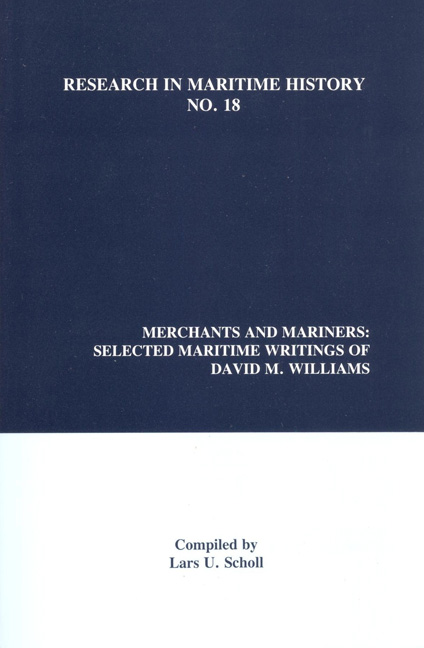“David Malcolm Williams: A Tribute from an Old Friend”
Summary
When Lars Scholl first suggested that David Williams’ sixtieth birthday should be marked by the publication of a selection of his writings, I was delighted to be asked to contribute a personal appreciation. At the same time, however, several of us were a little apprehensive, for although such an undertaking may be a regular practice in Germany, this form of tribute would only be given in Britain or North America to selected scholars on their retirement. Yet despite the fact that David's career still has a long way to go, his contributions to maritime history have been so significant that it was clear that they warranted renewed recognition at an earlier stage. Once these doubts had been resolved, we all sought to portray him in the ways that we knew him best. In my case it was decided that I should outline our lengthy friendship from being fellow undergraduates and postgraduates at the University of Liverpool to our long-standing relationship in both domestic and international professional bodies and associations.
This process inevitably involved a great deal of personal reminiscence and some degree of speculation on my part without any opportunity for either discussion or correction. Nevertheless, I felt justified in describing our association in detail so that readers might judge for themselves the basis on which many of my subsequent remarks were formulated. Any errors or omissions are entirely mine, but over a period of nearly forty-two years they can, perhaps, be excused.
In the autumn of 1957 I was in my third year as a teacher at an inner-city secondary modern school in downtown Birkenhead. At this time I was principally concerned with attempting to introduce some limited aspects of British history to frequently unresponsive pupils, who were in the main anxious to join the ranks of their elders, who were already fully employed. Although relishing the challenge which this presented, it had by then dawned on me that to make any serious progress in this profession would require the possession of a degree rather than merely my existing teaching certificate. I therefore approached my local authority and was informed that I could have a leave of absence, albeit without pay. Further, as I had received some support for my previous two-year course, it would be necessary for me to pay the appropriate university fees myself.
- Type
- Chapter
- Information
- Merchants and MarinersSelected Maritime Writings Of David M. Williams, pp. xxvii - xxxviiiPublisher: Liverpool University PressPrint publication year: 2000

